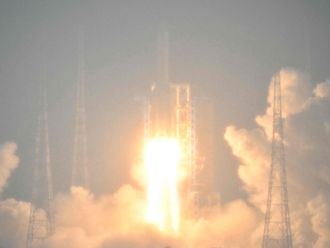Dhaka: The body of BNP chief and ex-prime minister Khaleda Zia’s self-exiled younger son Arafat Rahman Koko arrived home today for burial amid a political turbulence three days after he died in a heart attack in Malaysia.
Tight security was enforced as senior leaders of Zia’s Bangladesh Nationalist Party (BNP) received the body, which was accompanied by the deceased’s wife and two daughters on a Malaysian Airlines flight from Kuala Lumpur.
TV footage showed the 45-year Koko’s body being driven straight to her mother’s Gulshan office from where she is spearheading a fierce political campaign against the government of her arch-rival, Prime Minister Shaikh Hasina.
A large crowd was waiting at the Gulshan office despite a BNP-enforced nationwide blockade which entered its 22nd day on Tuesday, amid sporadic violence, with reports of two more fresh deaths overnight bringing the toll to 37 — nearly half of which occurred in arson attacks on public transport.
The latest two victims were truck drivers who succumbed to burn wounds early on Tuesday morning at two state run hospitals in the capital and northwestern Rangpur, days after suspected blockaders attacked their vehicles with petrol bombs.
The ruling Awami League said its leaders would take part in Koko’s ‘namaj-e-janaza’ or pre-burial prayers at Baitul Morarram National Mosque later on Tuesday.
Senior BNP leaders preferring anonymity said they planned to request Zia to invite Hasina to attend Koko’s ‘Qulkhwani’ or funeral prayers later this week as the premier earlier failed to meet her grieved arch-rival, after she was denied entry to her office.
“We will request madam [Zia] to invite the Prime Minister [Hasina] to attend the Qulkhwani but the decision will be taken by her,” an unmanned BNP leader told the Dhaka Tribune.
Hours after Koko’s death Hasina along with senior leaders of her ruling Awami League went to Zia’s Gulshan office but the gates were locked from inside and none of the BNP chief’s aides came to receive the premier as she and got off her car and waited for a few minutes.
The incident sparked controversy, prompting several BNP leaders to admit it was inappropriate behaviour on the part of Zia’s aides who earlier claimed the shocked ex-premier was asleep under the influence of sedatives administered to soothe her while Hasina came.
BNP leaders earlier said Koko was scheduled to be buried at a military graveyard at Banani area in the capital since he was the son of former army chief slain president Ziaur Rahman, who was also the founder of BNP.
But chairman of BNP’s ally Kalyan Party major general (retd) Syed Mohammad Ebrahim told journalists the authorities did not grant permission to bury him at the military graveyard.
“As a member of former military officer’s family, Koko has the right to be buried at there ... We do not know the reason behind the denial [but] it is quite frustrating,” Ebrahim told newsmen at a briefing at Zia’s office.
Neither the BNP or Zia’s family, however, had announced any decision where Koko would be laid to rest after the janaza prayers at the Baitul Mokarram Mosque in the afternoon but TV reports referring to unnamed sources said he could eventually be buried at a municipal cemetery in the capital in the evening.
Koko’s death comes as Zia is spearheading a massive antigovernment campaign enforcing a violent nationwide blockade since January 6 demanding dialogue with Hasina for a fresh inclusive midterm polls.
Zia’s elder son and BNP senior vice-president Tarique Rahman lives in London to evade trials in a number of graft and criminal charges, one for allegedly masterminding a grenade attack on a rally of the now ruling Awami League, in which 24 people were killed in 2004 — which Hasina narrowly survived.
But unlike his brother, Koko preferred to stay away from politics and maintain a low-profile though he was known for his passion for sports.
Koko, however, was arrested on September 2007 on graft charges under a massive anti-graft campaign under emergency rules during the past army backed interim regime and was paroled for treatment abroad in July 2008.
Koko first went to Thailand and lived there until 2011 and then went to Malaysia while a Dhaka court in the same year sentenced him to six years of imprisonment after trial in absentia.
Zia last met Koko in Singapore in 2012. But the whole family could not be together since 2007.












